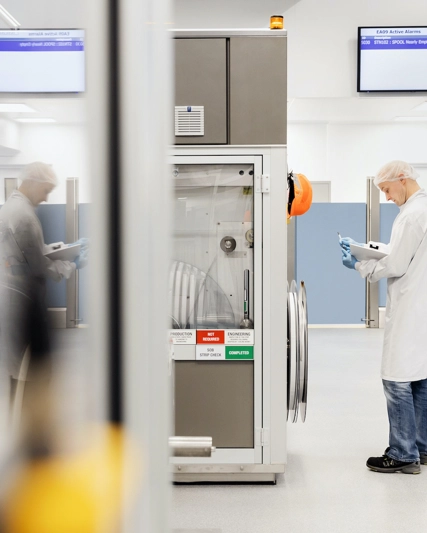Issued: London, UK
For media and investors only
GSK aims to redefine the future of respiratory medicine at the European Respiratory Society International Congress
- First presentation of SWIFT-1 and SWIFT-2 phase III trial data for ultra-long-acting biologic depemokimab in severe asthma
- GSK aspires to change the course of disease, reversing disease damage and, for patients with asthma, achieve long-term clinical remission
- 56 abstracts to advance scientific understanding and support GSK’s ambition to improve the lives of millions of people with respiratory conditions
GSK plc (LSE/NYSE: GSK) will share latest research findings from across its diverse respiratory portfolio of innovative therapies, including targeted biologics, vaccines and inhaled medicines, at the 2024 European Respiratory Society (ERS) International Congress in Vienna (7-11 September). The research, including three late-breaking abstracts, demonstrates the company’s commitment and ongoing ambition to redefine the future of respiratory medicine and deliver the next generation standard of care for millions of people affected by respiratory conditions like asthma, chronic obstructive pulmonary disease (COPD), refractory chronic cough and respiratory syncytial virus (RSV).
GSK’s ambitious goals build on decades of expertise, research and collaboration as the company works to reduce the global burden of respiratory diseases by providing protection from infections and the associated complications, preventing exacerbations, cumulative lung damage and disease progression while providing optimal treatment of symptoms. This means aiming for clinical remission for as many people with asthma as possible at the earliest point in their disease journey to protect their future health.
Study results from SWIFT-1 and SWIFT-2
The first presentation of the positive results from SWIFT-1 and SWIFT-2, which assessed the efficacy and safety of depemokimab versus placebo in adults and adolescents with severe asthma with type 2 inflammation characterised by blood eosinophil count, will be shared in a late-breaking alert session on Monday, 9 September at 3.45 CEST. Depemokimab is the first ultra-long-acting biologic to be evaluated in phase III trials with a binding affinity and high potency for interleukin-5 (IL-5), enabling six-month dosing intervals for patients with severe asthma. Long-acting treatments that combine an extended half-life with high potency have the potential to offer sustained suppression of the underlying drivers that contribute to disease outcomes and progression for extended periods.
Clinical remission in severe asthma
Data presented at ERS for Nucala (mepolizumab) builds on the already robust and expansive data on the role of targeting IL-5. Aiming for clinical remission is a critical treatment goal for patients with severe asthma and type 2 inflammation. Further data on clinical remission provides additional insights into evidence-based management strategies with research looking at characteristics that influence clinical remission and also the role of biologic therapy in achieving this treatment goal. Additional research for Trelegy (fluticasone furoate/umeclidinium/vilanterol or FF/UMEC/VI) will also look at clinical remission as a treatment goal in in other types and severities of asthma.
Research on COPD exacerbations
A post-hoc analysis from METREX and METREO will be presented, which shows the effect of Nucala in the trial participants with or without chronic bronchitis. A poster presentation of the study design of MATINEE, the third clinical study of Nucala in COPD, will be presented. MATINEE recruited COPD patients with broad clinical presentations of chronic bronchitis and/or emphysema, along with evidence of type 2 inflammation characterised by blood eosinophil count and builds on existing data for Nucala. Research being presented at ERS also includes the latest evidence to support the use of Trelegy in COPD and more specifically advancing research of disease stability as a realistic treatment goal.
Key abstracts presented at ERS
Encouraging new data will be presented from GSK’s portfolio that could transform outcomes for patients living with respiratory disease.
| Abstract Name | Presenter | Presentation Details |
|---|---|---|
|
Depemokimab efficacy/safety in patients with asthma on medium/high-dose ICS: the Phase IIIA randomised SWIFT-1/2 studies |
D. Jackson |
Oral presentation |
|
Depemokimab PK/PD in the 52-week randomised double-blind multicentre Phase III SWIFT-1 trial |
I. Pavord |
Oral presentation |
|
Mepolizumab in patients with asthma and features of COPD: a MENSA/MUSCA post hoc analysis |
I. Pavord |
Poster presentation |
|
Mepolizumab response in patients with COPD and an eosinophilic phenotype with/without chronic bronchitis (CB): a METREX/METREO post hoc analysis |
C. Vogelmeier |
Poster presentation |
|
Clinical trial design of biologic therapies in COPD: MATINEE study of mepolizumab |
I. Pavord |
Poster presentation |
|
Real-world assessment of clinical remission in asthma with biologics |
P. Howarth |
Poster presentation |
|
Clinical characteristics impacting clinical remission attainment in REALITI-A |
G. Canonica |
Poster presentation |
|
Assessment of the components of clinical remission with moderate–severe asthma after 24–52 weeks of treatment: CAPTAIN post hoc analysis |
I. Pavord |
Poster presentation |
|
Characteristics of patients meeting the components of clinical remission: CAPTAIN post hoc analysis |
S. Noorduyn |
Poster presentation |
|
Impact of varying lung function threshold on clinical remission in asthma with FF/UMEC/VI: CAPTAIN post hoc analysis |
I. Pavord |
Poster presentation |
|
Towards disease stability in COPD management: patient perspectives |
M. Brooke |
Poster presentation |
|
Impact of varying health status thresholds on disease stability in COPD with FF/UMEC/VI: IMPACT post hoc analysis |
D. Halpin |
Poster presentation |
|
Impact of varying lung function thresholds on disease stability in COPD with FF/UMEC/VI: IMPACT post hoc analysis |
D. Halpin |
Oral presentation |
About GSK in respiratory
GSK continues to build on decades of pioneering work to deliver more ambitious treatment goals, develop the next generation standard of care, and redefine the future of respiratory medicine for hundreds of millions of people with respiratory diseases. With an industry-leading respiratory portfolio and pipeline of vaccines, targeted biologics and inhaled medicines, we are focused on improving outcomes and the lives of people living with all types of asthma and COPD along with less understood refractory chronic cough or rarer conditions like systemic sclerosis with interstitial lung disease. GSK is harnessing the latest science and technology with the aim to modify underlying disease dysfunction and prevent disease progression.
About GSK
GSK is a global biopharma company with a purpose to unite science, technology, and talent to get ahead of disease together. Find out more at gsk.com.
Cautionary statement regarding forward-looking statements
GSK cautions investors that any forward-looking statements or projections made by GSK, including those made in this announcement, are subject to risks and uncertainties that may cause actual results to differ materially from those projected. Such factors include, but are not limited to, those described under Item 3.D “Risk factors” in GSK’s Annual Report on Form 20-F for 2023, and GSK’s Q2 Results for 2024.


